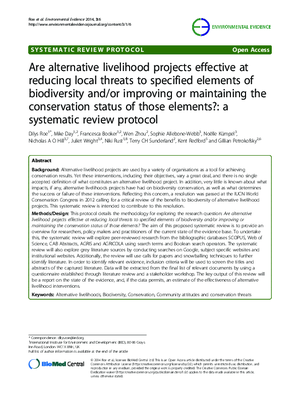Are alternative livelihood projects effective at reducing local threats to specified elements of biodiversity and/or improving or maintaining the conservation status of those elements?: a systematic review protocol
Alternative livelihood projects are used by a variety of organisations as a tool for achieving conservation results. Yet these interventions, including their objectives, vary a great deal, and there is no single accepted definition of what constitutes an alternative livelihood project. In addition, very little is known about what impacts, if any, alternative livelihoods projects have had on biodiversity conservation, as well as what determines the success or failure of these interventions. Reflecting this concern, a resolution was passed at the IUCN World Conservation Congress in 2012 calling for a critical review of the benefits to biodiversity of alternative livelihood projects. This systematic review is intended to contribute to this resolution.
https://biodiversitylinks.org/library/resources/rmp/groups/alternative-livelihoods-conservation/are-alternative-livelihood-projects-effective-at-reducing-local-threats/view
https://biodiversitylinks.org/library/resources/rmp/groups/alternative-livelihoods-conservation/are-alternative-livelihood-projects-effective-at-reducing-local-threats/@@download/image/image.png
File
Are alternative livelihood projects effective at reducing local threats to specified elements of biodiversity and/or improving or maintaining the conservation status of those elements?: a systematic review protocol
Author(s):
Roe, Dilys,
Day, Mike,
Booker, Francesca,
Zhou, Wen,
Allebone-Webb, Sophie,
Kümpel, Noëlle,
Hill, Nicholas A O,
Wright, Juliet,
Rust, Niki,
Sunderland, Terry CH,
Redford, Kent,
Petrokofsky, Gillian
Publication Date: 2014
DOWNLOAD FILE
Alternative livelihood projects are used by a variety of organisations as a tool for achieving conservation results. Yet these interventions, including their objectives, vary a great deal, and there is no single accepted definition of what constitutes an alternative livelihood project. In addition, very little is known about what impacts, if any, alternative livelihoods projects have had on biodiversity conservation, as well as what determines the success or failure of these interventions. Reflecting this concern, a resolution was passed at the IUCN World Conservation Congress in 2012 calling for a critical review of the benefits to biodiversity of alternative livelihood projects. This systematic review is intended to contribute to this resolution.



